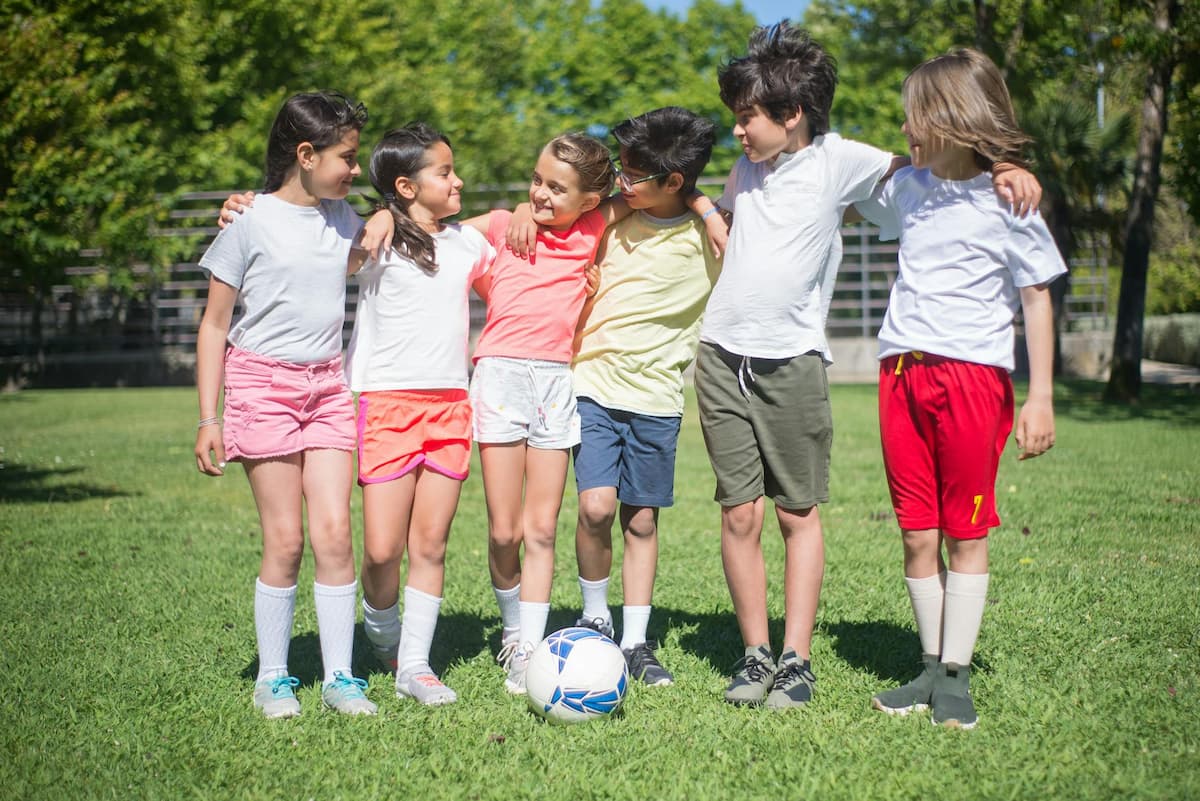How to Tell if Your Child is Ready for Sports
So, this whole thing about getting kids into sports can feel like a bit of a minefield, right? For the most part, parents get hit with a million opinions from every direction, and half the time it feels like there’s some invisible rulebook or something like that. A lot of people are saying “start them young”, but you also hear the whole “don’t pressure them”, and honestly, it’s confusing. Sure, watching live sports with them can start at any age, and that’s special, but watching them do sports sounds so endearing and special, too.
Like, how are you meant to know the right time to sign a child up for an actual sport and not just free-play at the park? And honestly, this is something to think about. Your kid needs structure, they’re filled with energy, so when is it a good time for them to be in a sports club or at least a more organised sport?
Here’s what “Ready” Really Looks Like
Right, so this part trips loads of parents up. There’s this wild idea that “ready” means super focused, disciplined, and capable of following detailed instructions, basically, how older kids and adults do it. But getting realistic here, you should keep in mind that most adults can’t even follow Pilates instructions without staring aggressively and trying to figure out what’s even going on (even just watching an exercise class, it still feels the exact same).
But for little ones, “ready” looks more like this: they can listen to one simple instruction at a time, like “run to that line” or “kick the ball that way”. It’s fairly simple, right? But of course, none of this will be perfect, just with some attempt. If there’s a bit of running the wrong direction, or some cartwheeling mid-session, it’s fine. You really can’t expect much from a small child. Besides, tiny kids have small attention spans anyway.
So, just being ready also means they can handle being around other kids in a structured setting. Well, getting specific here, it’s not having meltdowns the second another kid takes the ball or gets too close to them or something like that. So yeah, readiness isn’t about skills, it’s more about the general feeling that “this kid won’t crumble the second the whistle blows” Make sense?

Confidence Matters More than Skill
Alright, so this part is huge. A lot of parents worry that their child isn’t “sporty enough” or not coordinated enough yet. At five, four, six, three, these ages, well, no child is meant to be polished. Honestly, loads of them still fall over from wind. But what helps way more than skill is confidence, like the basic comfort of joining in. Yeah, even kids that age really do need some confidence. Kids who have been to nursery, pre-school, or playgroups usually adjust easier, because they’re used to group activities and taking turns.
But even if your child hasn’t done loads of that, it doesn’t inherently mean they shouldn’t join. Sometimes sports actually give them that confidence they don’t have yet. If a child is socially anxious or clings to a parent (basically one of those velcro kids), well, that doesn’t automatically mean no sport. Instead, it just means maybe choose a super-friendly, low-pressure class, not a club run by someone trying to recreate the World Cup but in toddler form.
You Need to Pick the Right Kind of Sport
You need to keep in mind that it’s also about choosing the right kind of sport for your kid. Like, some are way more child-friendly than others at this age. But it’s also about the pace and the general sport that your kid might like to play (if they even like sports in general). But it can help to look into classes, like beginner classes for your little one.
So, something like football classes for 5 year olds works because it’s usually built around fun, tiny drills, games, and building basic skills without any serious competition. Something like this is basically like a little social club anyway. But the biggest mistake is jumping straight into a super intense club with pushy coaching, scoreboards, or screaming parents on the sidelines acting like their child has brand deals waiting. Seriously, no child needs pressure, especially if they’re under the age of seven. It should feel fun, silly, and like something they look forward to.
This is a fast way to actually make a kid hate sports. Don’t make this mistake.
Watch for their Interest, Not Adult Expectations
Parents want to see themselves in their kid; they want that mini-me, which, sure, the idea is a really cute idea. Well, that and some adults sign their child up for a sport because, well, all their mates are doing it, or because they always pictured having that “sports parent moment”. Okay, now, there’s nothing wrong with that, but the child’s interest should lightly guide the decision. If the child kicks a ball around at home, copies sports they see on TV, or lights up when talking about playing with other kids, that’s usually a green flag.
If they show zero interest in team play and prefer solo activities like drawing, climbing frames, or lining up toys, it might just mean a solo-style sport suits them more, like swimming, dance, or gymnastics. Plus, not all sports need teams, and not all kids, even that young, are extroverted and want to be social. Maybe for now they’re not interested, maybe eventually they will be. But don’t push anything.
It Might be About Routine
At this age, the sport itself is almost irrelevant, yeah, you read that right. But the routine is what helps them grow. Again, it’s kind of like school in a way, because that’s how they learn structure. So, turning up weekly, seeing the same faces, learning patience, waiting turns, moving their bodies, hearing another adult give instructions, yeah, all of that teaches life skills that actually matter.
Basically, the sport is just a tool. Even if they don’t stay in that sport long term, the routine helps them feel secure and builds life skills (well, to a degree it does).

![[AD] We’re a cricket-mad family, so we’re buzzing that @thehundred is back this August! 🏏🔥
To get ready, M tried out the official FREE Activity Pack — and it’s brilliant! 🙌
Packed with fun games, creative challenges and sporty tasks, it’s perfect for getting kids hyped whether you’re at home or on the go.
👉Download yours now (link in bio)
@londonspirit @ovalinvincibles #EveryMomentCounts #TheHundred
#EnglandCricket #CricketFamily #TheHundredCricket #LondonBloggers #Cricket #CricketIsLife #kidsfun](https://suburban-mum.com/wp-content/uploads/2022/11/505472555_18531279601016840_7092520074819907569_n-180x320.jpg)



![[AD - Press visit]
We enjoyed the glorious sunshine this weekend with a trip to Brighton. We went on the @brightoni360official which is right by the sea front.
The i360 pod take a slow journey up, allowing you to take in views across Brighton and the South Downs 450ft above ground. There’s a bar inside with drinks and snacks available to purchase and the experience lasts 25 minutes.
Afterwards, we headed to the open air roller rink for a roller skating session!
The roller rink is:
⭐ Suitable for over 5s
⭐ £6.50 if you have your own skates or £9.50 if you need to hire them
⭐ 45 minutes per session
Full details to visit the i360 + skating
📍 Brighton i360, Lower Kings Road, Brighton BN1 2LN
🚗 Parking nearby (we parked in the Regency Square Car park)
🎟️ Prices start from £25.40 for an adult and £16.90 for a child
🕐 Opening hours are currently Sun-Fri 10.30am-18.30pm and until 19.30pm on Saturdays
☕️ Bar inside the i360, cafe and gift shop
Book tickets here:
https://tickets.brightoni360.co.uk/tickets/?_ga=2.195305772.1869001490.1689671753-1757164059.1689671753/#events?eventid=157](https://suburban-mum.com/wp-content/uploads/2015/04/417980235_313576471048632_3682382982231216432_n.jpg)

![[AD] ***Summer of fun at Barracudas Activity Camps!****
There is plenty for kids to do at @barracudas_activity_day_camps
From Tennis, Archery, Swimming, Motor Sports and more you can be sure that there will be something for kids aged 4.5-14. ⚽🏈🥅🎾🏓🏎️🏹🏊♂️🏉
You can book on a day by day basis - so it can fit in with any other days out/activities you have planned and there are early drop off and late pickup options available. Barracudas are also Ofsted registered so you can use your Childcare Vouchers too.
⭐⭐⭐Get £20 off a week or £4 off a day using my discount code: MARIA20⭐⭐⭐
#BarracudasActivityDayCamp #BarracudasActivityCamp #BarracudaAmbassadors #SummerHolidays #SchoolHolidays #Summer2023 #SummerCamp #DayCare #Camp #KidsCamp #surreymummy #surreymums #SummerOfFun #ActivityCamps #HolidayCamps #Childcare #SchoolHolidays #schoolholidaycamps](https://suburban-mum.com/wp-content/uploads/2024/07/353583570_625625966167953_545896259645102575_n.jpg)



![[AD] We have some super exciting news...we have been chosen to be Laser Quest Ambassadors, and the boys are over the moon!
We are really lucky that our local Laser Quest (@laserquestkingston) is just around the corner from us. It means we can pop in of a weekend or anytime during the school holidays, and with summer just around the corner, I know Laser Quest will be one of our go-to places for some family fun.
As well as games of Laser Quest, there are also VR experiences and arcade amusements too. To find out a bit more about how Laser Quest works, you can read my blog post: https://www.suburban-mum.com/laser-quest-kingston/ (clickable link in bio)
Don't forget to keep an eye out for our Laser Quest posts - I'm going to be giving away two family passes to use at Laserquest Kingston!
If you can't wait and want to head down to Laser Quest to try it out, use the code SUMMER30 for 30% off your booking. The code is valid from now until the end of August 2023 and can be used on Laser Quest games and birthday party bookings.
#LaserquestAmbassador #Laserquest #LaserquestKingston #ActivitiesForKids #FamilyFun #DaysOutWithKids #Lasertag #LaserquestVR #Kingston #ThingsToDoInKingston #SurreyFamilyDaysOut #ThingsToDoWithKids #RainyDayFun #SurreyMummy #SurreyLife #LifeWithKids #LifeWithBoys #familyfunday](https://suburban-mum.com/wp-content/uploads/2015/04/353230107_797358078406942_2405522556733455165_n.jpg)

![[AD] The sun has finally made an appearance and the boys have been making the most of it by spending it
in the garden.
They’re go-to is always football and they’ve been trying to improve their aim and accuracy with the new Messi Foldable Footlball goal from the #MessiTrainingSystem range.
I love the fact the goal is foldable, making it easy to store away when not in use. It is also lightweight so you can effortlessly pack it up and take it to the park or to a friend’s house.
The Messi Foldable Football Goal retails at £36 and can be purchased from @argos
You can read my full review here: https://www.suburban-mum.com/messi-foldable-football-goal/
#TrainLikeMessi #FoldableFootballGoal #FootballSkills #OutdoorFun #LionelMessi #LeoMessi #FootballAtHome #OutdoorKids #JustGetOutside #OutdoorsAndFree #ScreenFreeKids #WhateverTheWeatherKids @flair_gp](https://suburban-mum.com/wp-content/uploads/2015/04/341194882_615024710178056_41977149395989448_n.jpg)

![[AD] We are absolutely thrilled to announce that we are Barracuda Ambassadors again this year.
With Easter just around the corner, the boys were sent the @barracudas_activity_day_camps new camp kit in preparation for the school holidays.
There’s a wide range of activities for kids aged 4.5 - 14 including Tennis, Archery, Basketball, Arts & Crafts and more.
If you like the sound of Barracudas, find out more over on their website. You can also save £20 a week or £4 a day, using my discount code: MARIA20](https://suburban-mum.com/wp-content/uploads/2024/07/336812306_765234558514317_685553691647241974_n.jpg)


![[AD - Gifted]
Last weekend we were invited to try out @tsarettaspice’s new Bottomless Brunch menu and I can tell you it was thumbs up all round!
There’s a good choice tapas on offer from Punjabi fish fingers, Indo Chinese Chicken to Spiced Lamb Scotch Eggs and Manchurian Cauliflower (which was amazing!)
If you’re local to Twickenham and fancy giving them a try here’s are the details.
Tsaretta Spice Bottomless Brunch
⭐️£37.50 per head for bottomless Prosecco or cocktail of the day
⭐️£55 per head for bottomless Champagne
⭐️ Food included: 4 tapas selections and dessert or 2 tapas selections, a pav or naanwich and dessert
⭐️ Non-alcohol brunch is also available
Tsaretta Spice
55 Church Street
Twickenham
TW1 3NR
You can also read our full review over on the blog (link in bio)](https://suburban-mum.com/wp-content/uploads/2024/07/334565436_5960402314015030_663031098700829518_n.jpg)
![[AD] What does family look like for you?
I am fortunate to be surrounded by strong, powerful women in the form of my mum, sister and mother-in-law (along with many others). With Mother’s Day just around the corner, @BootsUK want to celebrate all the different mums and mother figures we are lucky enough to have in our lives. They have a huge range of Mother’s Day gifts to choose from so we can show them how much they mean to us. (swipe to take a look at some of my choices)
If you want to express love and appreciation for the mother figure(s) in your life, head to Boots.com to find the ideal gift. They have a whole host of gifts, so you can be sure to find something to suit all tastes. Celebrate the #LoveForAllMums this Mother’s Day with Boots.
](https://suburban-mum.com/wp-content/uploads/2015/04/334276459_136658625736352_6403224988403337253_n.jpg)



